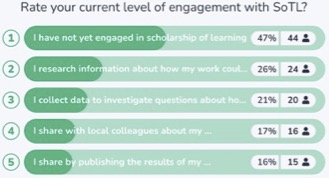
In this post, Professor Heather McQueen and Jessica O’Loughlin reflect on and share their experience presenting their keynote at the Learning and Teaching Conference 2023↗️. Heather is Professor of Biology Education within the School of Biological Sciences. Jessica has recently graduated from her undergraduate Biochemistry Hons degree at The University of Edinburgh. This post belongs to the July-August Learning & Teaching Enhancement theme: Learning and Teaching Conference 2023↗️.
When I received the invitation to present a keynote at the university’s fantastic annual learning and teaching conference, I was blown away (a mixture of delight and fear infused with an unhealthily large dose of imposter syndrome). On recovering clarity, I was particularly pleased with the opportunity that this presented, to be joined as presenter by undergraduate student SoTL co-researchers Jessica and Sophie. As we prepared our presentation, however, I became increasingly doubtful about the value and interest to the audience of simply sharing our own SoTL stories. Recognising these feelings of inadequacy for what they were, we decided to include sub-themes about inclusion and feeling disadvantaged, mentioning our own issues as Scottish women fitting in at this university. This linked nicely with one of our SoTL stories about addressing poor learning outcomes for underserved demographic groups, such as Scottish students at this university.
A second major issue during the slide preparation phase was addressing accessibility requirements which, I confess, I had previously not engaged with fully. Because needs are diverse accessibility advice can be very varied (and sometimes contradictory). In addition, accessibility advice often directly advises against my long-rehearsed methods for stimulating and engaging the audience in presentations, such as lively colour and animations. I literally spent days trying to box my presentation into a mutually acceptable format. Painful although this process was, it has given me a greatly increased appreciation of accessibility needs and I believe it has changed, forever, how I prepare presentations, so pain equals gain methinks.
We found presenting the opening keynote on the day of the conference to be an exhilarating experience, boosted by the palpable buzz of participant anticipation in the lovely Larch lecture theatre at the new Nucleus building↗️. All thoughts of imposters were gone and the audience responded well to the personal response (Wooclap↗️) questions that Sophie and Jessica posed, confirming that there is plenty room and enthusiasm for SoTL growth at this university.


SoTL goals set by attendees via Wooclap.
Jessica writes:
I thoroughly enjoyed being a part of the Teaching and Learning Conference this year! I am very grateful to Heather for inviting me to speak alongside herself and Sophie for the keynote talk. It was nice to share my experiences about how I got involved with our research and the many connections I’ve made along the way. Above all it was so encouraging to meet people involved with the student experience from many other departments around our university, across the UK, and around the world!
I closed my keynote with some final messages, one of which was a call to arms to get involved in SoTL with the encouragement to ‘think big’. In the second keynote of the day, the inspiring Irma Meijerman cleverly contradicted that people should instead ‘think small’, this revision of the message wisely reminding people to attend to the detail and to focus their SoTL project on something tangible, achievable and measurable. Finally at the third keynote of the day, Gert Biesta insisted that we should instead think differently, at first seeming to contradict a number of messages from both of the earlier keynotes. On reflection, however, the differences seemed to hang on alternative definitions of terms; ‘student-centred learning’, for example, being defined by Gert as attending to what students want as opposed to my earlier definition of planning the learning around what the students need. Most importantly, the variety of presenter viewpoints stimulated highly engaging discussion at the end of day drinks reception, from what I remember.
While feedback from colleagues on my keynote was very affirming, overwhelmingly the most-received comment was how impressed people were by the confidence and aplomb of my student co-presenters. They are clearly going places! Many teaching colleagues sought me out for chats on shared ideas about effective teaching, which was not unexpected and highly enjoyable. However, I also noted interestingly different responses to the sub-themes of my keynote dependent on to whom I was speaking. A small number of Scottish women from ordinary backgrounds, like me, thanked me for sharing my own personal experiences and highlighting the isolation that some can feel in the workplace, which resonated with them. Interestingly this sub-theme was not commented on by anyone except those people. Secondly, one person from a non-teaching student-facing welfare role told me that they went straight back to the office and posed the idea of collecting some data for their own SoTL initiative. These responses were extremely gratifying to hear since they picked up on the double meaning of our title: ‘A place for everyone’.
Over the two days of the conference I was most impressed by the many thoughtful presentations led by students, which seems to be a welcome growing trend for our learning and teaching conference. In addition, both staff and student presenters were repeatedly coining terms such as ‘support’ ‘sharing’ and ‘personal’ as evidence of the palpable move towards collaboration and compassion in teaching. This makes me very happy.
You can watch Heather, Jessica and Sophie’s keynote talk, ‘SoTL: A Place for Everyone‘, in the video below:
 Heather McQueen
Heather McQueen
Heather McQueen is Professor of Biology Education within the School of Biological Sciences. Her current academic interests lie in active learning techniques, student engagement in large classes and inclusive education, but she is also passionate about canine learning. She is the course organiser and lead developer of the new first year biology course Life 1, and is SFHEA and a National Teaching Fellow.
 Jessica O’Loughlin
Jessica O’Loughlin
Jessica O’Loughlin has recently graduated from her UG Biochemistry Hons degree at The University of Edinburgh. Jessica’s experience with teaching research primarily involve analysing data collected from wellbeing and academic activities ran in pre-honours Biology courses, with the aim to investigate students’ participation with these and evaluate their effectiveness. She has also done separate research on the impact of the early stages of the pandemic on the education of S4-6 pupils in Scotland.


